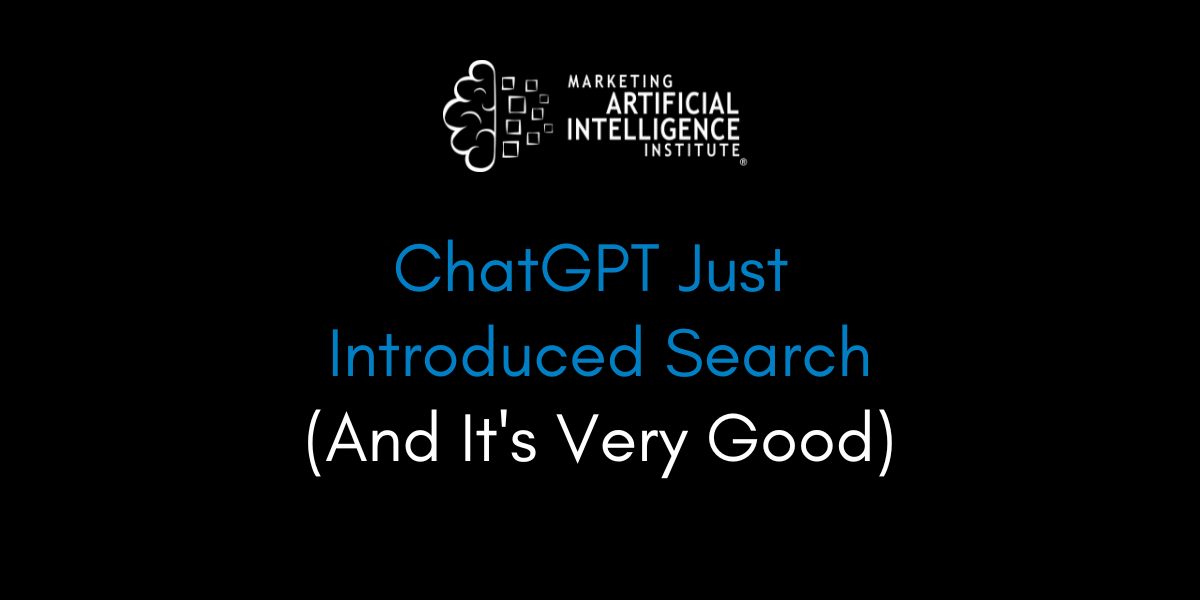OpenAI just rolled out a major update to ChatGPT that could change how we find information online: ChatGPT can now search the web, and early tests suggest it's incredibly powerful.
But there's an important twist that almost everyone is missing:
This isn't just about building a better search engine—it's about fundamentally changing how we access and consume information.
I got the inside scoop from Marketing AI Institute founder and CEO Paul Roetzer on what this means for search, Google, and the future of how we find information online during Episode 122 of The Artificial Intelligence Show.
What's New with ChatGPT Search
ChatGPT's new search capabilities include:
- Natural language queries that automatically trigger web searches when needed
- Direct links to source material and citations
- Specialized displays for categories like weather, stocks, sports news, and maps
- Real-time information access for current events, scores, and market data
- Integration with major news publishers including AP, Reuters, and Financial Times
The rollout is tiered based on subscription type: ChatGPT Plus and Team users have immediate access, enterprise and education users will get access in coming weeks, and free users will have to wait months.
Early Impressions: A Clean, Ad-Free Experience
In his testing, Roetzer found the experience of ChatGPT search remarkably smooth.
When planning a trip to Florida, ChatGPT automatically provided a logical structure with inline citations covering everything from transportation to accommodations. For sports scores, it pulled and synthesized information from multiple sources, with direct links to articles.
But what really stood out was the clean, ad-free interface.
"I really enjoy the no-ad experience," says Roetzer. When stacked up against a competitor like Perplexity, he found its interface now felt cluttered in comparison.
"Perplexity started to feel a bit obsolete to me,” says Roetzer. “When you have this totally clean interface with no ads or anything, Perplexity just felt different to me all of a sudden, and not as modern and clean."
This Isn't a New Plan—It's Been Years in the Making
While this update might seem sudden, OpenAI has been planning this move for years.
“This isn't a new thing. OpenAI has been thinking about search and how they would handle it for years, and Sam has openly talked about it for a while,” says Roetzer.
In a March 2024 interview with Lex Fridman, Altman talked about how OpenAI wasn’t interested in just building a better search engine than Google. If they pursued search at all, he noted, it would be to help people find and synthesize information in a better way. (For what it’s worth, he also expressed a strong aversion to monetizing that search through ads.)
This could be the first step in creating a new, better way to access information.
Why This Matters: Beyond Just Search
There are a couple reasons why this update is so important, says Roeztzer.
First is that it solves the “knowledge cutoff” problem that large language models have.
“You have to remember that large language models have a cutoff date on their knowledge base,” he says.
For instance, GPT-4o’s cutoff is October 2023.
“When it's not connected to the internet, it basically doesn't know anything about the world from the last 13 months.”
Adding search capabilities to ChatGPT, however, gives the models access to up-to-date information, which also cuts down on the amount of hallucinations from the model.
“So you can have greater accuracy and reliability if you can vet the outputs with real-time data and search information,” says Roetzer.
Second, search in ChatGPT enhances the tool’s personalization. It enables better localized results and improves the relevance of responses for individual users. It also opens up possible industry-specific applications in sectors that require real-time, accurate information, like legal services or healthcare.
What This Means for Google
There’s no question that this impacts Google. How much, though, remains to be seen. Google still owns 90% of search market share, says Roetzer. And AI-powered competitors like Perplexity barely even register compared to that dominance.
But the real question isn't just about market share—it's about the future interface of information access.
"I think part of this is an interface question," says Roetzer. “What is the interface of the future?” A few years from now, will we rely on voice AI, live within large language models, or interact with technology in some other way?
If the interface of the future does end up being an LLM or AI assistant, that could represent a major threat to Google.
“But I'm sure people at Google are paying attention and playing out possible paths that this could go,” says Roetzer.
Mike Kaput
As Chief Content Officer, Mike Kaput uses content marketing, marketing strategy, and marketing technology to grow and scale traffic, leads, and revenue for Marketing AI Institute. Mike is the co-author of Marketing Artificial Intelligence: AI, Marketing and the Future of Business (Matt Holt Books, 2022). See Mike's full bio.



